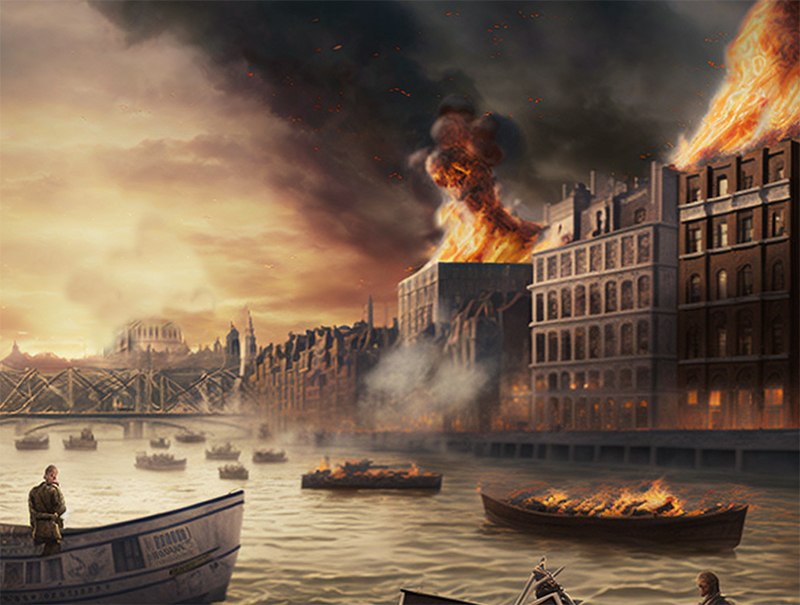
London 1666
On Wings Of Ruin – Prologue
The fire started in the house of the King’s baker in Pudding Lane, or so the neighbours said. John Storey was there, listening to the firefighters’ complaints. The houses nearby should have been torn down to choke the monster’s gullet, but the Lord Mayor would not take the initiative to destroy private property.
‘A woman could piss it out,’ Bloodworth said, waving his hand at the growing inferno before returning to his bed.
Storey had been on his way home from the alehouse, unsteady on his feet but happy in his own way. A bawdy song came to mind and he sang at the top of his voice along the narrow lanes where houses were so close their shingled eaves almost kissed above his head.
‘You that a fair maid’s heart would obtain,
Eagerly court and ogle and kiss,
Whining and sighs are all but in vain
Courage does lead the way into bliss.’
The contents of a piss pot narrowly missed him as he smartly stepped aside on hearing the shutters angrily pushed open. A kiss would be welcome, and a little more besides, but Mistress Marina had turned him away, saying she was not of the mood.
‘I am uneasy, John, and I don’t know why.’ Nothing for it then but to swallow a last pint, sling his short cloak over his shoulder and be on his way. Mistress Marina was not to be tickled into submission when that pretty mouth turned sour.
‘’Fie sir, why sir, I’ll sooner die, sir!’
Now are exchanged for another tone,
Blushing and smiling and wantonly toyling,
Are the soft language of lovers alone.‘
Towards Pudding Lane he would go. Too early yet for the smell of fresh-baked bread ready for the King’s table; instead there was a reek of burnt thatch and an unnatural glow in the sky that reached higher as he watched.
Monday brought a dreadful dawn, surely this was retribution from a vengeful God, with the fires of eternity now licking at the city like thirsty salamanders. Some even claimed to have seen hounds and horses stampeding through the conflagration, but not the earthly kind. These were said to be the rampaging forerunners of the Wild Hunt, soon to be followed by hordes of murderous warriors ready to take their pleasure with anything the flames left behind.
To the south the Thames roiled and steamed, mirroring the inferno against the darkness of its depths. Some now gave thanks for the river they often cursed as nought but a cess pool unfit to drink, but the fire soon found its way along London Bridge, pausing only at the empty space between buildings.
In Lombard Street to the north, bankers were now rushing to rescue sacks of gold thought to be melting in the heat. The Royal Exchange was but a smoking shell as St Paul’s caught and was quickly consumed. Even the House of God could not withstand the demon’s fury.
Storey fought the flames as night became day and day became night again, his throat as dry as old parchment. The cutlass at his side was almost too hot to the touch, but he had used it to free tethered horses in the mews behind the houses of the rich. A young maid offered him ale from a water skin. He drank greedily, and would have thanked her with coin, but she disappeared into the maelstrom of seething crowds. Few stopped to fight the flames, intent instead on saving themselves and their belongings, or running here and there, not knowing which way to turn, bewildered by the ferocity of the fire and the fate that had befallen the great city.
‘There are children up there,’ a woman screamed at his side. ‘I could not get to them. Little ones, a boy and a girl.’
Her eyebrows had been singed and her face too, the skin hanging loose in fine wafers.
‘Where?’ he shook her shoulder and she winced, but then recollected herself. ‘They ran to the back of that house. The top of the servants’ stair.’
Storey knew the layout of these houses. They had all been built to the same plan. He pushed his way through the struggling mass of people. Someone tried to force a leather bucket into his hands, but the water had run out long ago. Better now to try to rescue these waifs, if they still lived.
On the stairs the fire was dancing like imps, snatching at his velvet coat, sending sparks from flaming fingers to sear his boots. The heat created a devilish wind, and it was this that forced the flames back long enough for him to mount the stairs. There they were, crouched on the top landing, the boy shielding his sister, eyes red and streaming from the smoke. She was clutching the lad’s jacket, trying to hide her face, but when she saw him she reached out. The boy held her tighter.
‘Come,’ he called, expecting them to run to him, but they shrank back. What did he look like, hair blackened and singed, his jacket smoking, framed against the fire at his back?
There was no chance to get back down the stairs. There would be a way to the roof through the attic. Storey ran forward, took the girl in one arm, dragged the boy behind him through the choking smoke, higher still, eventually opening onto an arched space filled with boxes, heavy furniture, old chests. Had he been a scavenger there would have been much to tempt him here. Stumbling forward he heard the boy speak. ‘A way onto the roof.’ He pointed at a door partly hidden by an old armoire.
‘Good lad.’ Soon they were scrambling over the tiles. This was a wealthy man’s house, built of solid brick and without the customary thatch. There were flat spaces between the pitch and Storey headed for those.
When he set the children down and lifted his streaming eyes to the sky he was appalled by the sight of London burning. For the moment they were safe, but the house could not resist the conflagration for long. Already the neighbouring dwelling was totally consumed, beginning to collapse into fiery hell. Soon it would be their turn.
The children clung to him. How would they survive? The people below had drawn back, unable to get close enough now to fight the flames. Storey saw his past life before him. Was it time to bid it all goodbye, taking the King’s shilling, the life of a Royal courier by day, nights carousing with his fellows at one alehouse or another, his tiny room in Fish Street with his treasures, a few books and a fine pair of boots; what was that now? Fish Street too was aflame.
The little girl had golden hair but the boy was dark, his amber eyes wide with fear, reflecting the tongues of fire. Southey moved them back from the heat as far as he could, but soon they were on the edge of the roof looking down three floors to a smoking yard below. He could jump, taking them both with him, but they would not survive, or if by some miracle they did they would be maimed for life. Perhaps that was the better option.
A dreadful roar came as the front part of the house collapsed, leaving them stranded behind a large, brick chimney. That would be the last thing to go. If they sheltered here would this part of the roof hold? They would have to jump. There was nothing else for it. He held the children tighter, his arms circling them like a mother bird’s wings. Briefly he wondered if their bodies would ever be found. The inferno was now so fierce that their bones would be nothing but ash among the acres of embers once the fire was spent.
Then the boy spoke. ‘Look,’ he pointed to the very heart of the gathering flames. ’She is here.’
Southey thought then he must be hallucinating. Was this an angel come to take their souls to heaven at their final moments on earth?
As the figure approached the flames subsided, and he could see through her shifting form to the orange sky beyond. Was she made of ice? Her hand reached out, beckoning.
‘John Storey,’ she said. ‘Come. Bring the children.’
